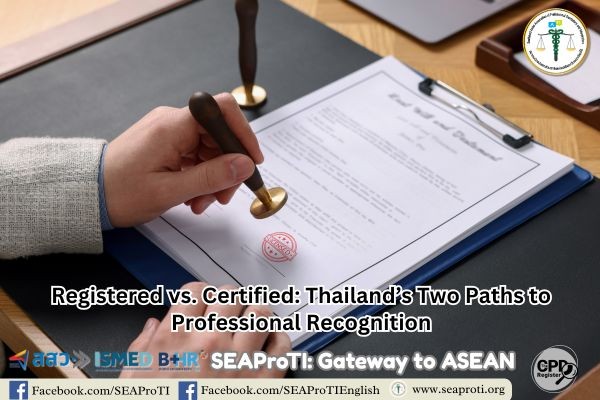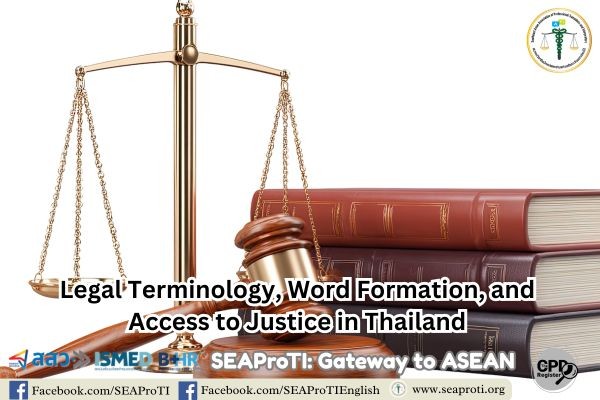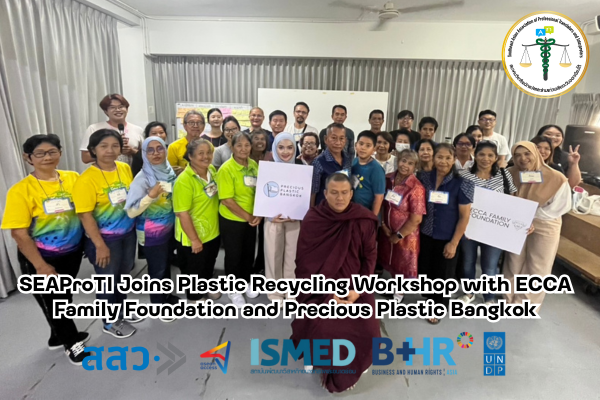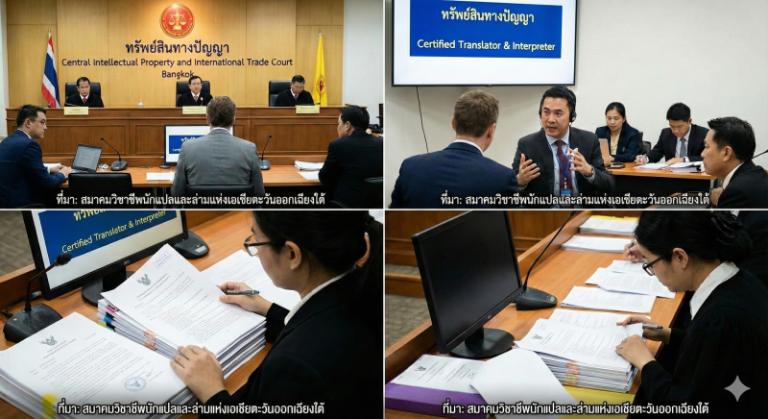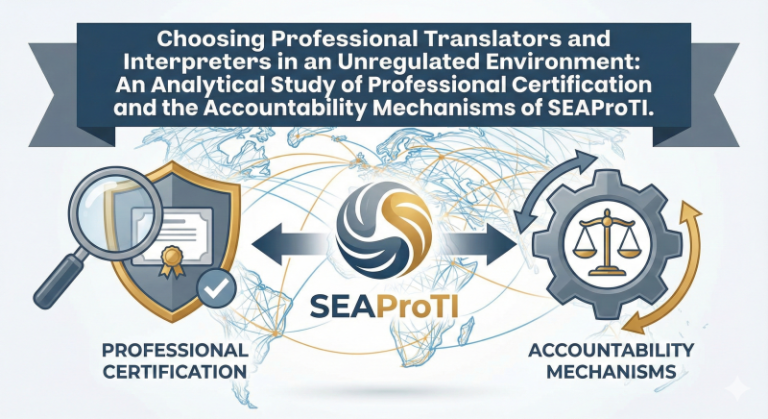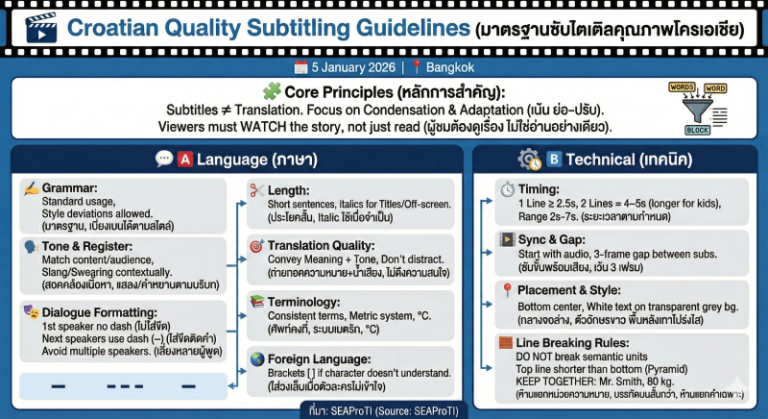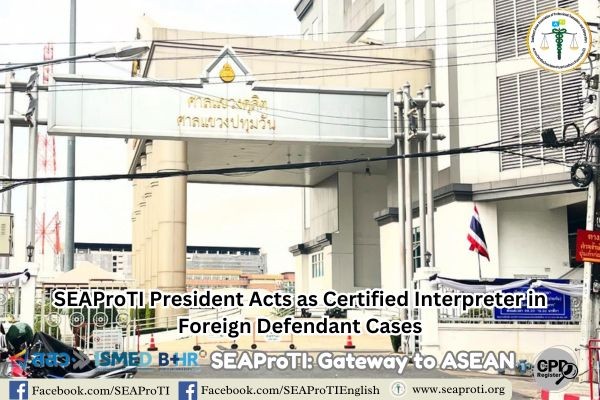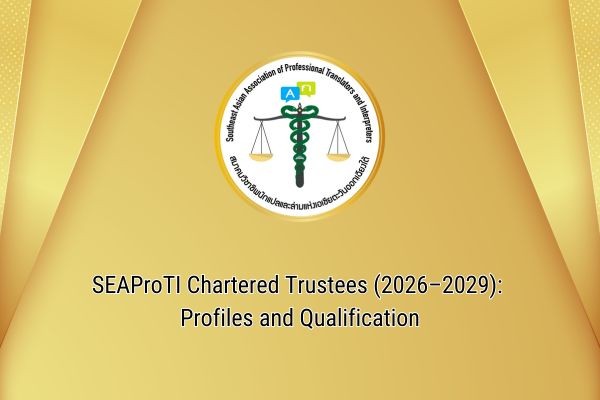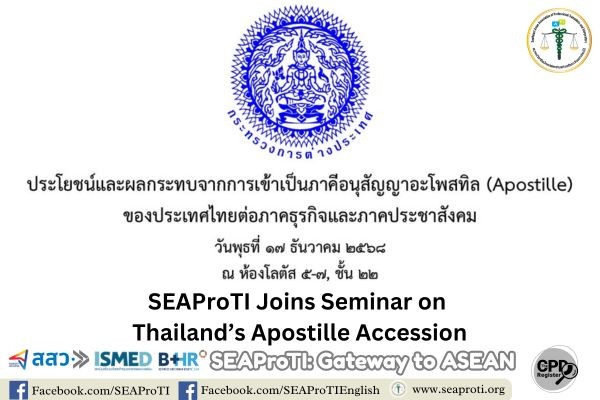“Registered” vs. “Certified”: Understanding the Divide Between State Recognition and Professional Validation in Thailand
4 November 2025, Bangkok – In Thailand, the terms “registered” and “certified” are often used interchangeably in everyday and even professional contexts—especially in fields where credibility and ethical accountability are paramount, such as translation and interpreting. Yet, in legal and professional terms, these two concepts differ fundamentally. Understanding the distinction between administrative registration and professional certification is essential for translators, interpreters, and institutions that wish to ensure both lawful recognition and professional integrity.
“Registration” refers to the act of notifying a government agency and having one’s name officially recorded in an administrative registry. It establishes an individual’s or organization’s legal existence within a governmental system, allowing authorities to monitor, regulate, or recognize certain rights.
Key Characteristics:
- Reflects administrative status, not professional ability.
- Aims primarily at control, data collection, or legal eligibility.
- Does not involve assessment of qualifications, ethics, or performance.
- Court interpreters registered with the Court of Justice.
- Translation companies registered with the Department of Business Development.
- Freelance professionals registered with the Social Security Office.
Being registered means one is recognized in the eyes of the law, but it does not certify professional competence. Registration grants legal visibility—not professional credibility.
By contrast, “certification” involves an evaluation of knowledge, skills, and ethics conducted by a professional body according to recognized standards. Certification confirms that an individual has demonstrated sufficient competency to perform professional duties at a qualified level.
Key Characteristics:
- Represents professional assessment, not just administrative record.
- Involves examinations, portfolio review, or peer evaluation.
- Certificates are often time-bound and require continuing professional development (CPD) to renew.
- Certified Translators or Certified Interpreters accredited by the Southeast Asian Association of Professional Translators and Interpreters (SEAProTI).
- Medical interpreters certified by NAATI (Australia) or ATA (U.S.).
- Engineers holding licenses from the Council of Engineers of Thailand.
Certification verifies that a practitioner meets recognized standards of knowledge, ethics, and professional conduct, providing credibility in both domestic and international contexts.
| Aspect | Administrative Registration | Professional Certification |
|---|---|---|
| Issuing Authority | Government agency | Professional association |
| Legal Nature | Administrative record | Professional evaluation |
| Purpose | Regulation and supervision | Quality assurance and credibility |
| Assessment | ❌ None | ✅ Required |
| Recognition | Legal existence | Professional competence |
| Example | Court interpreter registered with the Judiciary | Certified Interpreter (SEAProTI) |
Conclusion
“Registration” means the State knows you exist. “Certification” means the profession confirms you are qualified.
In short, registration establishes one’s administrative legitimacy, while certification confirms one’s professional capability. For translators and interpreters in Thailand, both are necessary: registration ensures compliance with administrative law, while certification upholds ethical and professional standards aligned with international benchmarks.
SEAProTI’s certification framework thus bridges this divide offering not only a mark of competence but also a system of accountability, transparency, and continuing development that reinforces public trust in the profession.
References
- Office of the Judiciary. (2023). Interpreter registration guidelines. Court of Justice of Thailand.
- Southeast Asian Association of Professional Translators and Interpreters (SEAProTI). (2024). Professional standards and ethics for certified translators and interpreters. SEAProTI Press.
- Southeast Asian Association of Professional Translators and Interpreters (SEAProTI). (2025). SEAProTI certification and credentialing framework. SEAProTI Publications.
About Certified Translators, Translation Certifiers, and Certified Interpreters of SEAProTI
The Southeast Asian Association of Professional Translators and Interpreters (SEAProTI) has formally announced the qualifications and requirements for registration of Certified Translators, Translation Certification Providers, and Certified Interpreters in Sections 9 and 10 of the Royal Gazette, published by the Secretariat of the Cabinet, Office of the Prime Minister of Thailand, on 25 July 2024 (Vol. 141, Part 66 Ng, p. 100). Certified Translators, Translation Certification Providers, and Certified Interpreters
The Council of State has proposed the enactment of a Royal Decree, granting registered translators and recognized translation certifiers from professional associations or accredited language institutions the authority to provide legally valid translation certification (Letter to SEAProTI dated April 28, 2025)
SEAProTI is the first professional association in Thailand and Southeast Asia to implement a comprehensive certification system for translators, certifiers, and interpreters.
Head Office: Baan Ratchakru Building, No. 33, Room 402, Soi Phahonyothin 5, Phahonyothin Road, Phaya Thai District, Bangkok 10400, Thailand
Email: hello@seaproti.com | Tel.: (+66) 2-114-3128 (Office hours: Mon–Fri, 09:00–17:00)
“ขึ้นทะเบียน” vs “รับรอง”: ความแตกต่างระหว่างการยอมรับของรัฐและการยืนยันของวิชาชีพ
4 พฤศจิกายน 2568, กรุงเทพมหานคร – ในประเทศไทย คำว่า “ขึ้นทะเบียน” (Registered) และ “รับรอง” (Certified) มักถูกใช้แทนกันในชีวิตประจำวัน โดยเฉพาะในวงการวิชาชีพที่ต้องอาศัยความน่าเชื่อถือ เช่น การแปลและการล่าม แต่ในความเป็นจริง ทั้งสองคำนี้มีฐานะทางกฎหมายและความหมายทางวิชาชีพที่แตกต่างกันอย่างชัดเจน การเข้าใจความแตกต่างนี้จึงเป็นสิ่งสำคัญสำหรับผู้ประกอบวิชาชีพ นักแปล ล่าม รวมถึงหน่วยงานที่เกี่ยวข้อง เพื่อป้องกันความสับสนและส่งเสริมมาตรฐานวิชาชีพให้มั่นคง
“การขึ้นทะเบียน” (Registered) — การยอมรับในทางปกครอง
“การขึ้นทะเบียน” หมายถึง การแจ้งข้อมูลต่อหน่วยงานรัฐเพื่อให้รัฐบันทึกชื่อหรือสถานะของบุคคลในระบบราชการ เช่น การขึ้นทะเบียนล่ามศาล หรือการขึ้นทะเบียนบริษัทแปลเอกสารกับกรมพัฒนาธุรกิจการค้า การขึ้นทะเบียนเป็นเพียงการ “รับรู้การมีอยู่” ของผู้ประกอบอาชีพในระบบกฎหมาย แต่ไม่ได้ประเมินคุณวุฒิหรือความสามารถทางวิชาชีพ
“การรับรอง” (Certified) — การยืนยันความสามารถทางวิชาชีพ
ในทางกลับกัน “การรับรอง” หมายถึง การที่องค์กรวิชาชีพ เช่น สมาคม SEAProTI ทำการประเมินความรู้ ทักษะ และจรรยาบรรณของบุคคล เพื่อยืนยันว่าผู้นั้นมีสมรรถนะเพียงพอที่จะปฏิบัติงานในมาตรฐานสากล ผู้ที่ได้รับการรับรองจึงถือเป็นผู้มี “คุณวุฒิทางวิชาชีพ” ไม่ใช่เพียงผู้มีชื่อในทะเบียนราชการเท่านั้น
เปรียบเทียบโดยสรุป
| ประเด็น | การขึ้นทะเบียน (Registered) | การรับรอง (Certified) |
|---|---|---|
| หน่วยงานผู้ออก | หน่วยงานของรัฐ | สมาคมหรือองค์กรวิชาชีพ |
| ลักษณะทางกฎหมาย | การบันทึกชื่อในทะเบียนราชการ | การประเมินสมรรถนะทางวิชาชีพ |
| วัตถุประสงค์ | เพื่อควบคุมหรือเก็บข้อมูล | เพื่อรับรองคุณภาพและมาตรฐาน |
| การสอบประเมิน | ❌ ไม่มี | ✅ มีการทดสอบและประเมิน |
| ตัวอย่าง | ล่ามขึ้นทะเบียนกับศาล | Certified Interpreter จาก SEAProTI |
สรุป
“การขึ้นทะเบียน” คือ รัฐรับรู้ว่าคุณมีอยู่ในระบบ “การรับรอง” คือ วิชาชีพยืนยันว่าคุณมีความสามารถ
กล่าวอีกนัยหนึ่ง การขึ้นทะเบียนคือ “สถานะทางปกครอง” ส่วนการรับรองคือ “สถานะทางวิชาชีพ” นักแปลและล่ามที่ต้องการความน่าเชื่อถือในระดับสากลควรมีทั้งสองสถานะควบคู่กัน เพื่อให้เป็นทั้งผู้ที่ “ถูกต้องตามกฎหมาย” และ “ได้มาตรฐานตามวิชาชีพ”
เอกสารอ้างอิง (References)
- สำนักงานศาลยุติธรรม. (2566). แนวทางการขึ้นทะเบียนล่ามศาล. ศาลยุติธรรมแห่งประเทศไทย.
- สมาคมวิชาชีพนักแปลและล่ามแห่งเอเชียตะวันออกเฉียงใต้ (SEAProTI). (2567). มาตรฐานและจรรยาบรรณวิชาชีพนักแปลและล่ามรับรอง. กรุงเทพฯ: SEAProTI.
- สมาคมวิชาชีพนักแปลและล่ามแห่งเอเชียตะวันออกเฉียงใต้ (SEAProTI). (2568). ระบบการประเมินและการรับรองคุณวุฒิวิชาชีพแปลและล่าม. กรุงเทพฯ: SEAProTI.
เกี่ยวกับนักแปลรับรอง ผู้รับรองการแปล และล่ามรับรองของสมาคมวิชาชีพนักแปลและล่ามแห่งเอเชียตะวันออกเฉียงใต้
สมาคมวิชาชีพนักแปลและล่ามแห่งเอเชียตะวันออกเฉียงใต้ (SEAProTI) ได้ประกาศหลักเกณฑ์และคุณสมบัติผู้ที่ขึ้นทะเบียนเป็น “นักแปลรับรอง (Certified Translators) และผู้รับรองการแปล (Translation Certification Providers) และล่ามรับรอง (Certified Interpreters)” ของสมาคม หมวดที่ 9 และหมวดที่ 10 ในราชกิจจานุเบกษา ของสำนักเลขาธิการคณะรัฐมนตรี ในสำนักนายกรัฐมนตรี แห่งราชอาณาจักรไทย ลงวันที่ 25 ก.ค. 2567 เล่มที่ 141 ตอนที่ 66 ง หน้า 100 อ่านฉบับเต็มได้ที่: นักแปลรับรอง ผู้รับรองการแปล และล่ามรับรอง
สำนักคณะกรรมการกฤษฎีกาเสนอให้ตราเป็นพระราชกฤษฎีกา โดยกำหนดให้นักแปลที่ขึ้นทะเบียน รวมถึงผู้รับรองการแปลจากสมาคมวิชาชีพหรือสถาบันสอนภาษาที่มีการอบรมและขึ้นทะเบียน สามารถรับรองคำแปลได้ (จดหมายถึงสมาคม SEAProTI ลงวันที่ 28 เม.ย. 2568)
สมาคมวิชาชีพนักแปลและล่ามแห่งเอเชียตะวันออกเฉียงใต้ เป็นสมาคมวิชาชีพแห่งแรกในประเทศไทยและภูมิภาคเอเชียตะวันออกเฉียงใต้ที่มีระบบรับรองนักแปลรับรอง ผู้รับรองการแปล และล่ามรับรอง
สำนักงานใหญ่: อาคารบ้านราชครู เลขที่ 33 ห้อง 402 ซอยพหลโยธิน 5 ถนนพหลโยธิน แขวงพญาไท เขตพญาไท กรุงเทพมหานคร 10400 ประเทศไทย
อีเมล: hello@seaproti.com โทรศัพท์: (+66) 2-114-3128 (เวลาทำการ: วันจันทร์–วันศุกร์ เวลา 09.00–17.00 น.


